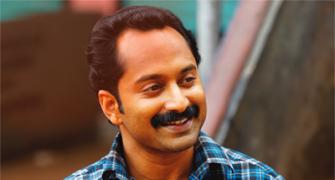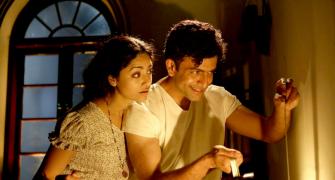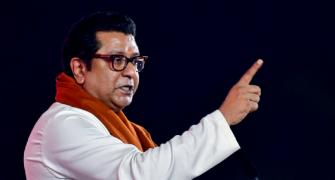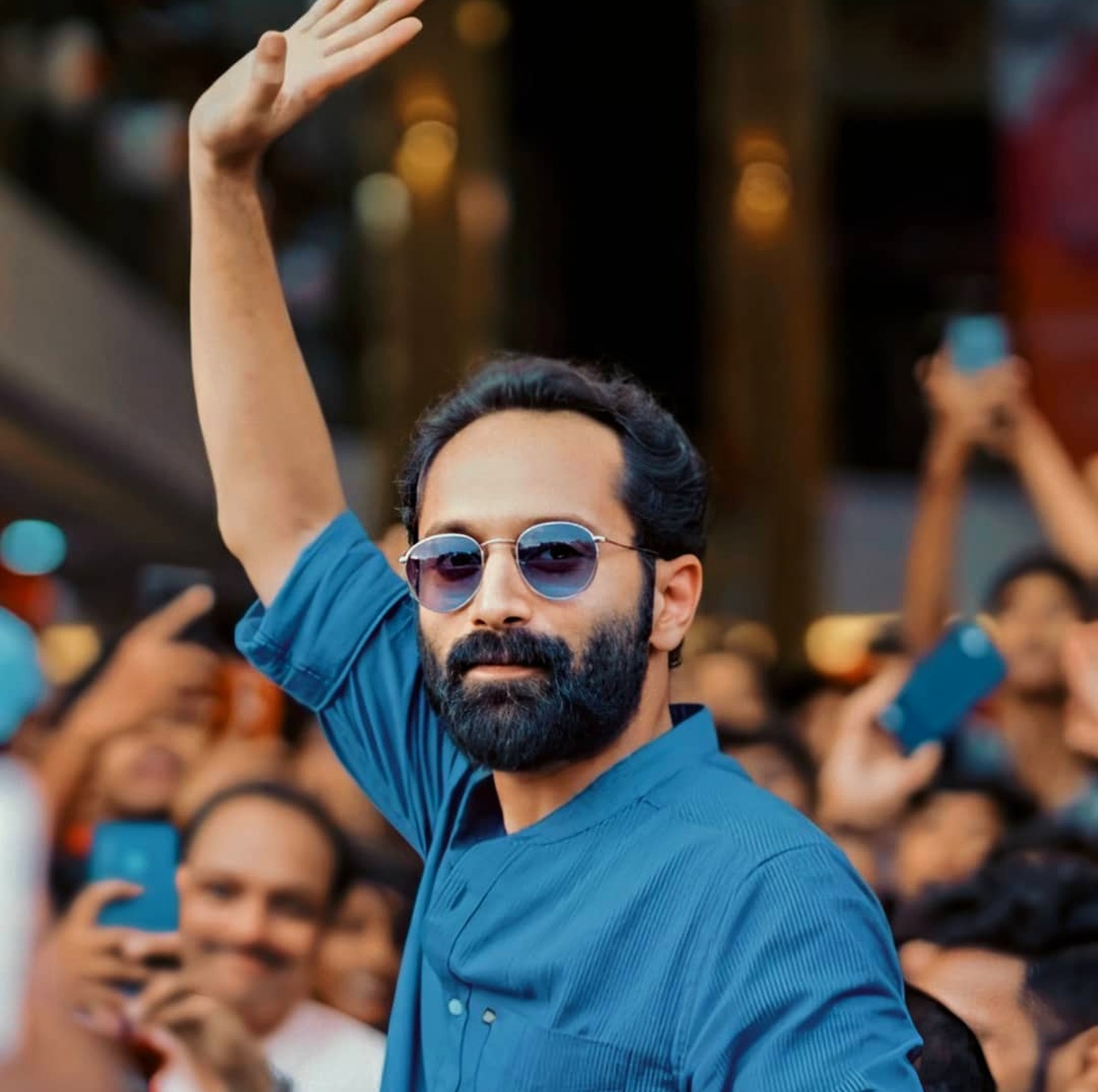Watching Aavesham is like sprinting through the whole history of our mass-masala movies and seeing it in a new light, notes Sreehari Nair.
And this, incidentally, is the story of Fahadh Faasil's career too.
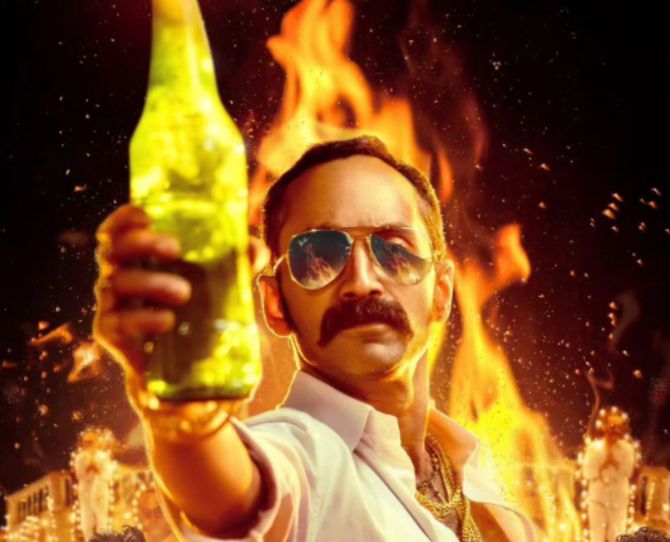
It's easy to think of Jithu Madhavan's Aavesham as a send-up of mass movies. But what it actually is, is a send-up of a fantasy common to most Indian boys.
The fantasy has to do with finding a version of your favourite mass movie hero in your immediate neigbourhood, raising yourself to the status of his blue-eyed pet, and spending the rest of your life as the cock of the walk.
The three boys in Aavesham get their mass movie hero in the form of Fahadh Faasil's Ranga, only to discover how poorly the staples of a much-loved movie genre stack up against the whims of human behaviour.
This is one of the rare, honest Indian films made about adolescents, made in a movie culture that thrives on keeping its viewers in a state of permanent adolescence.
We are a country where a Rajkumar Hirani drama that preaches the importance of non-violence and a Rajamouli myth-piece that celebrates bubblegum violence both pride themselves on granting the viewer enough distance from what's happening on the screen. It is that lulling 'distance' that you are not granted in Aavesham.
Make no mistake; the movie is designed to be enjoyed in the company of a large audience.
I watched it with a whistling lot that had come ready to be commanded and commandeered by Fahadh (an oversized monster, Ranga's preferred catchphrase 'Eda Mwone' was lapped up as if it were at once a gentle cooing call and an open-chested dare).
But Aavesham also works on another level. It works as a collection of moments where the racing of the heart becomes proportional to how well the familiar façades are torn down and how fast the hinges come off.
The 'highs' of a typical mass movie are all there, but once you have taken in the highs, the aftershocks slowly descend upon you.
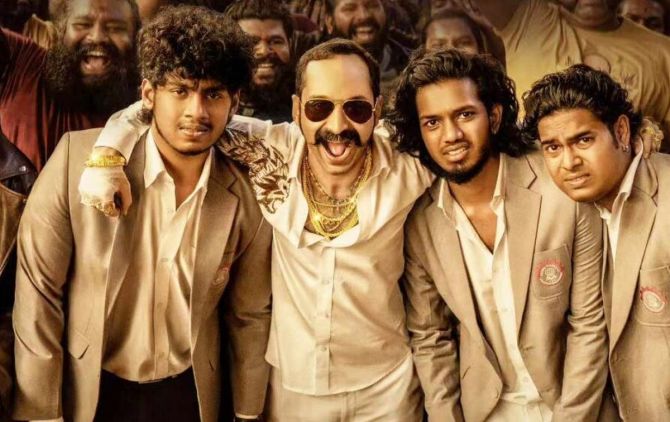
Jithu Madhavan's titles offer some measure of his ambition.
His first movie was called Romancham, and in that movie he had shown you just how prickly 'goosebumps' can become.
In opting for a title like Aavesham, Jithu seems to be demonstrating what it means to feel so 'charged' as to finally run out of breath.
As with Romancham, Aavesham is a comedy about kiddie games that turn serious.
This time, a bunch of 'mass'-loving boys almost end up getting it in the neck.
If producer Anwar Rasheed had been salivating for long at the prospect of Fahadh Faasil playing Ranga, you can see why that was the case.
The picture needs Fahadh because no other Indian movie star has clawed and scratched at the greasepaint of old-school mass movie heroisms with such relish.
In Joji, in Carbon, in Maheshinte..., he played men who wanted to be grandees of their domestic epics, before 'life' happened to them.
Now, in Aavesham, he fashions a character straight out of the mass movie manual, but gives him that peculiar combination of the autumnal, the vulgar, and the practical.
This is in part what throws the three boys off; the other big reason being that Aju, Shanthan, and Bibin are hardly conceived in mush.
Soiled from the very beginning, running their two-bit swindles, basking in a kind of general squalor, they are students of an engineering college in Bangalore, with shared histories that stretch back to toddy shops in Alappuzha.
While the three boys who become the focal point of the narrative are themselves 'delicious derelicts,' the ones on the margins are no softies either -- they are all ambassadors of mordant wit and everyday sadisms (the juniors fry their omelettes over hot iron boxes, the seniors use their college ID cards as spanking paddles).
Insofar as the boys are innocent, their innocence errs on the side of over-glamorizing the tawdry life -- and Jithu Madhavan styles his movie so as to put this subtle fact over.
Sushin Shyam's 'Grotto Chants' is the boys' idea of Gangsta-house Muzak; Sameer Tahir's camera points up their taciturn nature (a substantial percentage of their communication happens through overlapping rings of cigarette smoke); if violence to the boys is an excuse to beat back boredom, then Vivek Harshan's editing rhythms bring out this moody predilection.
When they are taken out of their hostel rooms one night and skinned by a houseful of surly seniors, Aju, Shanthan, and Bibin become a team of avenging angels. And even as this happens, you can see that they are too ragtag a team, too democratic in a sense, to be bound by hierarchies.
The humiliation meted out to the three boys is first felt in the lowered brow and thinned lips of Aju (he is played by an actor who goes by the screen-name Hipzster. As a thought-experiment, I put 'Hipzster' and 'DOT' from Archies together, and that gave me a chance to speculate if social media handles were about to replace parental enforcements).
Aju may be the one who pulls Ranga out of his grotto, but the other two boys soon sweat off their sidekick-status.
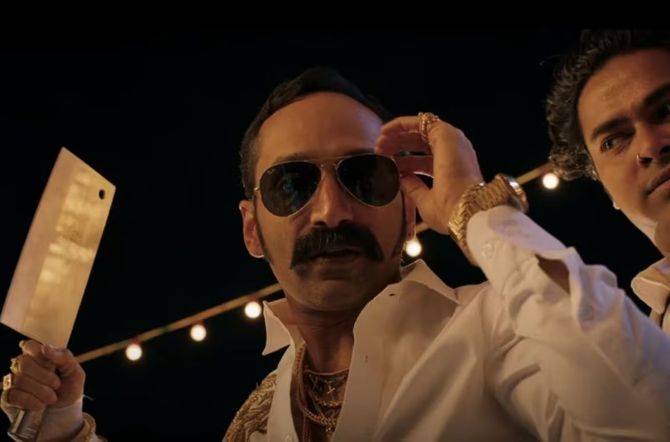
Roshan Shanavas, who plays Shanthan, proves himself to be an evolution from Nivin Pauly by way of Phil Hartman (Shanthan looks at the world of the gangsters with such nearsighted wonder that he becomes our surrogate), and Mithun Jai Shankar's Bibin is a Dickensian kid who receives his life-lessons in murky dens instead of a poorhouse.
When Fahadh's Ranga takes a shine to Bibin, Bibin not only grows in confidence and stature, but the sudden spotlight has the effect of making him seem like a schoolboy who has just popped his cherry.
Ranga may orchestrate such shifts of power, but within his own gang there's an extra premium paid to obedience, to fealty, to a lobotomized existence.
Drenched in gold and whites, he is the gangster who abstains from guns but is possessed of the finest Sam Elliot-moustache since Elliot himself.
Though his roots are firmly in Kerala (it's a sin to him if you don't have Mohanlal's Kireedam on your mental speed dial), he has made it big in Bangalore -- and this explains his vernacular, which can only be described as 'Malayalam fading into Kannada.'
These accouterments should have sufficed, but Ranga also has Amban.
Amban is Ranga's furious fist as well as his one-man PR agency. As with all movie-land bodyguards, Amban has to be programmed to think, and then he becomes Ranga's thought-in-motion.
The kittenish laughter undersells his broad back and his wide shoulders, and when he flexes those for his boss, the bulwark becomes a bull.
Fahadh's Ranga is a plotter of his own monument, and it's for this gangster-pharaoh that Amban plays a series of parts: he is the chief chiseller, the errand-dude, and the lighting-and-costume man, all rolled into one.
He is so loyal that he doesn't even see himself as a second-in-command; if Ranga were to die, Amban would probably retire and take up mushroom farming somewhere in Krishnarajapura.
Ranga, the ventriloquist, may have turned Amban into the perfect puppet, but the mastery of Sajin Gopu's performance is evident in the way he suggests that the puppet has feelings too.
Without preparing you in the slightest, Sajin Gopu waves you into Amban's moment of climactic hurt, and when it arrives, it breaks your heart just a little.
The excessive loyalty he demands, those ostentatious displays that come with the package, and his insistence on violence being rational and purposeful are some of the reasons why the three boys start off seeing Ranga as a figure of fun.
Fahadh draws out the laughs, draws them out by the beer pitchers, and then, in one fell swoop, he orders you to stop laughing.
It's then that the movie goes up a gear.

A lot has been made about the fight before the intermission (when the sadistic seniors are pummeled, with colours and banners flying and crowds cheering), but it's the second half of Aavesham that makes the movie.
In the theatre I was watching, I could mark out the precise instant when the whistling gave way to paranoid giggles.
The 'everyboy dream' of getting a ring-side view of street heroism and of being accepted into the big league is gradually shattered when the boys are thrown headlong into a battery of near-death experiences, thrown first into a binge-drinking session and then pushed onto a Ferris wheel, thrown in with paid women who do their best to give the bucks a good bang.
And then comes the fated dumb charades scene, which is something to set beside Joe Pesci's 'What do you mean, I'm funny?' meltdown from Goodfellas.
This scene is where Ranga completely loses it, and necks are put on the line.
Come to think of it, the scene is essentially about Fahadh the great actor appearing as someone who simply cannot accept that he is a bad actor, and I swear it caused at least a few in my audience to stop breathing.
This is also the scene that confirmed to me that Fahadh Faasil can play us all like a piano.
The most terrifying aspect of Fahadh's *this* avatar, when it works (and it didn't, in a movie like Trance), is that it's formed out of a genuine affection for his victim.
You know you are not watching a mere 'pscyho' so much as watching 'the psycho as a self-designated guardian.'
This is the psycho deciding what dress someone should wear, or by when they ought to come back home, or how badly they need to focus at a game.
Few things in current Indian cinema may be scarier than Fahadh Faasil taking in with an open-mouthed smile somebody's response to his sincere suggestion.
An approval from the victim is met with a wholesome shake of the head, a censure with a downcast frown that seems to hold the key to all psychiatric disorders.
The boys in Aavesham emerge from the dumb charades scene barely alive; and toward the end, when they beg that they be allowed to leave, Fahadh as Ranga blesses them with the theatrical brio of the Messiah sending down a thunderbolt.
What Jithu Madhavan has managed to bring off here is a cheerful dethroning of popular tastes: His movie is about boyish fantasies being turned inside out, even as mother's love jostles for screen-time with a raging inferno.
Watching Aavesham is like sprinting through the whole history of our mass-masala movies and seeing it in a new light.
And this, incidentally, is the story of Fahadh Faasil's career too.
There's a scene in the movie where the three boys go out on a night of revelry with Ranga, and wake up in a terrain of Bangalore completely alien to them.
When his energy and his humanity are filtered through the right sensibility, Fahadh offers us the equivalent of waking up with our devices overthrown.
He tricks us into believing that he is giving us a rerun of all those familiar tropes of heroism, and then he twists the knife.
Has any other Indian leading man done more to jolt us out of our adolescence?
Feature Presentation: Rajesh Alva/Rediff.com

